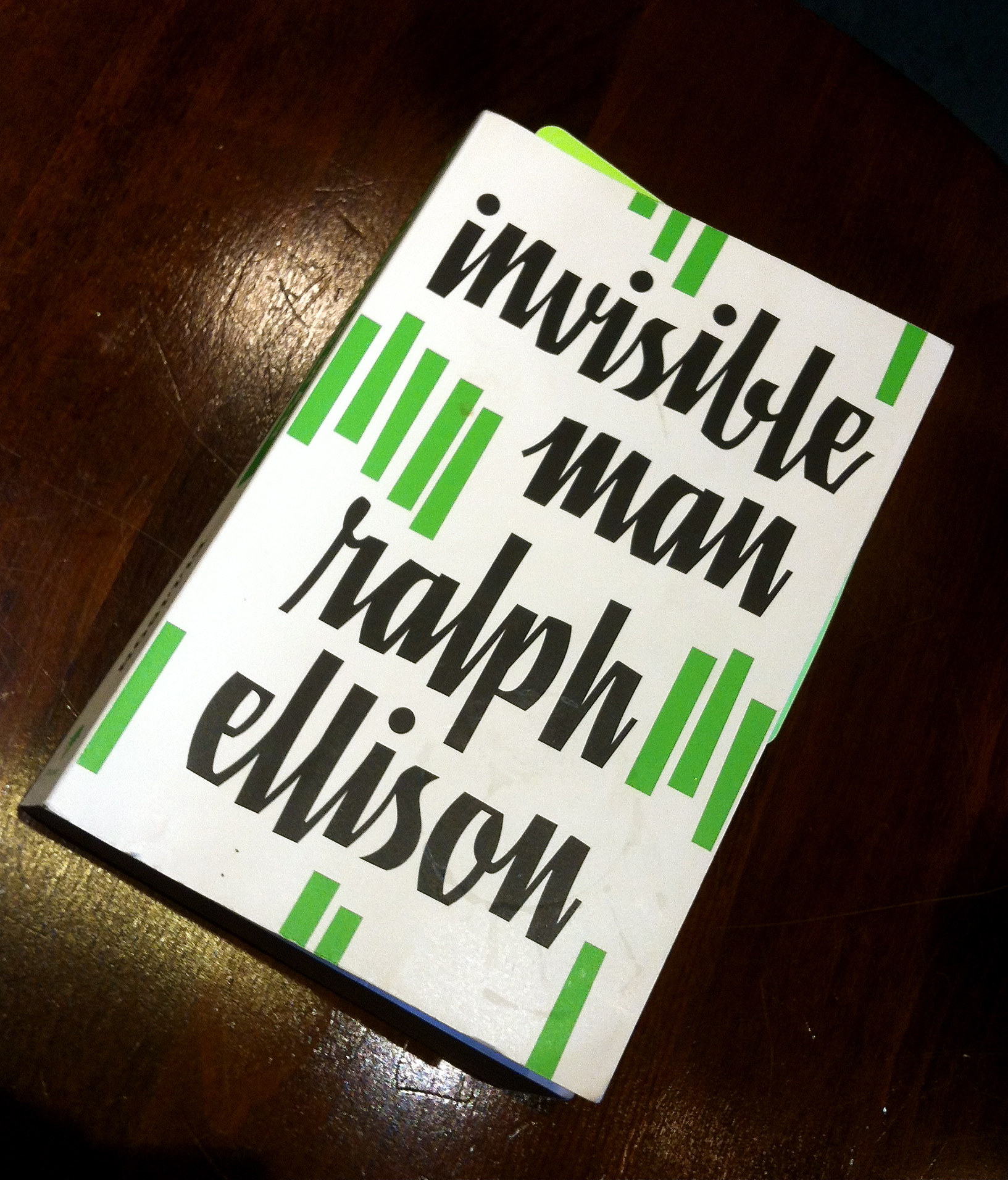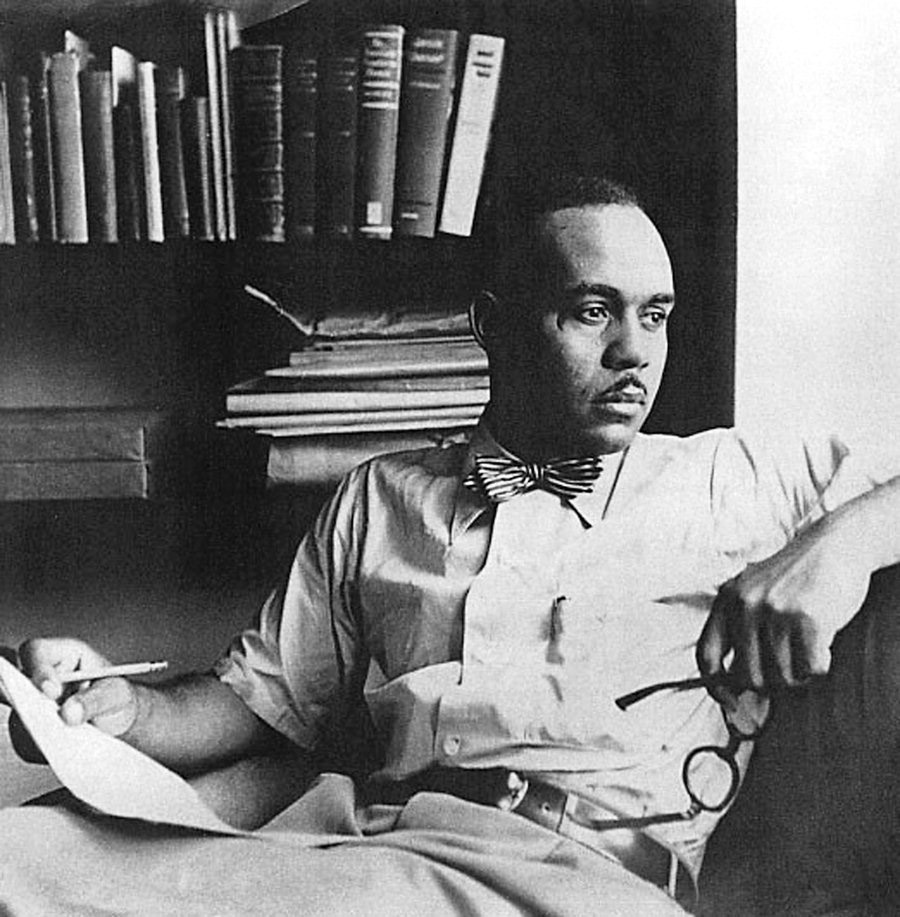Ralph Ellison’s 1952 Novel “Invisible Man”
 Invisible Man is a dense piece of text, but if you have enough free time and a love for words and African American history then it’s more than worth it.
Invisible Man is a dense piece of text, but if you have enough free time and a love for words and African American history then it’s more than worth it.
Sometimes the words won out over clarity though – the head trauma/hospital scene hardly makes any sense at all. There’s an out of place prologue from our nameless protagonist, where he tells us his current situation: living rent free under the radar in New York City, stealing electricity with a basement apartment covered in lightbulbs – his own personal form of sticking it to the man after years of being taken advantage of.
You’d think that foreshadowing this heavy would ruin the suspense of the entire book, but there’s no way anyone could guess the all the terrible things that happen to this poor boy trying to figure things out for himself – in the south society won’t let him and in the north there’s not a soul who cares.
Finally though he is stabbed in the back too many times to try anymore, going through an aimless wandering phase until he witnesses the eviction of an elderly couple in Brooklyn. The community gathers to watch the police move everything the couple has out onto the street and the scene nearly escalates to a riot when our protagonist feels compelled to speak, and his talent for moving people with words becomes a local news story. The Brotherhood recruited him that night, and even though he just felt lucky to have a job, joining the Brotherhood would be the last self-sacrifice he’d make before realizing how important the self actually is.
His first speech as a Brother (and yes, they all call each other Brother so-and-so) was regarded as a failure by the elder brothers because it relied too much on emotion and too little on the literature detailing the Brotherhood principles that he’d only had a few days to study. The speech was the book’s major highlight, although the story does get a lot more interesting once our protagonist becomes the star of a racial equality , almost cult-like protest movement.
After an anticlimactic beginning interrupted by some mouthy audience members, this “emotional speech” continued,
“There was a stir behind me. I waited until it was quiet and hurried on.
‘Silence is consent,’ I said, ‘so I’ll have it out, I’ll confess it!’ My shoulders were squared, my chin thrust forward and my eyes focused straight into the light. ‘Something strange and miraculous and transforming is taking place in me right now… as I stand here before you!’
I could feel the words forming themselves, slowly falling into place. The light seemed to boil opalescently, like liquid soap shaken gently in a bottle.
‘Let me describe it. It is something odd. It’s something that I’m sure I’d never experience anywhere else in the world. I feel your eyes upon me. I hear the pulse of your breathing. And now, at this moment, with your black and white eyes upon me, I feel… I feel…”
I stumbled in a stillness so complete that I could hear the gears of the huge clock mounted somewhere on the balcony gnawing upon time.
‘What is it, son, what do you feel?’ a shrill voice cried.
My voice fell to a husky whisper, ‘I feel, I feel suddenly that I have become more human. Do you understand? More human. Not that I have become a man, for I was born a man. But that I am more human. I feel strong, I feel able to get things done! I feel that I can see sharp and clear and far down the dim corridor of history and in it I can hear the footsteps of militant fraternity! No, wait, let me confess… I feel the urge to affirm my feelings… I feel that here, after a long and desperate and uncommonly blind journey, I have come home… Home! With your eyes upon me I feel that I’ve found my true family! My true people! My true country! I am a new citizen of the country of your vision, a native of your fraternal land. I feel that here tonight, in this old arena, the new is being born and the vital old revived. In each of you, in me, in us all.
‘SISTERS! BROTHERS!
WE ARE THE TRUE PATRIOTS! THE CITIZENS OF TOMORROW’S WORLD!
‘WE’LL BE DISPOSSESSED NO MORE!’
The applause struck like a clap of thunder.”

Ralph Ellison. Image from Star News Online.
The story circles back to the beginning, but without the protagonist obviously ending in his hole in a basement filled with 1,369 lights. The prologue is actually the most interesting part, but only once you’ve read the book already – it references characters not introduced till the 300th page, although the general meaning can still be understood.
It begins,
“I am an invisibile man. No, I am not a spook like those who haunted Edgar Allan Poe; nor am I one of your Hollywood-movie ectoplasms. I am a man of substance, of flesh and bone, fiber and liquids – and I might even be said to possess a mind. I am invisible, understand, simply because people refuse to see me. Like the bodiless heads you see sometimes in circus sideshows, it is as though I have been surrounded by mirrors of hard, distorting glass. When they approach me they see only my surroundings, themselves, or figments of their imagination – indeed, everything and anything except me.”
After a beginning like that, I was hooked, especially with the somber poetic link between race and invisibility. The rest of the book moves more slowly, carefully and eloquently telling the story of a black boy caught between his grandparent’s generation of slavery and his own time – one painfully pushing towards equality, attempting to undo centuries of hateful thinking and misconceptions, even within his own mind.




